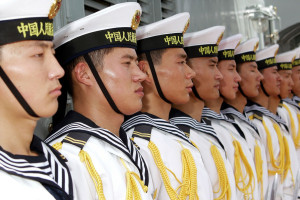
Indians have illegally crossed the LAC to encroach on China’s territory, charges Beijing
Vienna/Beijing/New Delhi: International Atomic Energy Agency (IAEA) Director General Rafael Grossi termed the AUKUS (Australia-United Kingdom-United States) deal to provide nuclear submarine as a “very tricky question” in a television talk show on September 28, 2021. His statement prompted China to declare today that the IAEA safeguards mechanism cannot verify whether Australia will use the highly enriched uranium in the power reactors of nuclear submarines for nuclear weapons.
“It is a technically very tricky question and it will be the first time that a country that does not have nuclear weapons has a nuclear sub,” IAEA chief Rafael Grossi had told the BBC‘s HardTalk programme in comments broadcast yesterday.
“As Director General Grossi said, the nuclear submarine cooperation among the US, the UK and Australia will be the first time that a non-nuclear-weapon state introduces a nuclear submarine, which will exclude the highly-enriched uranium from IAEA’s supervision. In brief, this is a malicious exploitation of loopholes in international rules for out-and-out proliferation activities. Supervisions on the Australian nuclear submarines will set a precedent, concerns the rights and obligations of all IAEA member states, especially signatories to the NPT, and will have far-reaching impact on the international non-proliferation system,” Chinese foreign ministry spokesperson Hua Chunying told journalists here today.
China claimed this was not an issue between the IAEA Secretariat and the three countries and that it should be handled by all member states through joint consultation. “China will stay in communication with the IAEA Secretariat and other member states to resolutely defend the authority and efficacy of the international non-proliferation system,” Chunying said.
Chinese State Councilor and Foreign Minister Wang Yi too had pointed out yesterday when co-chairing the China-EU High-Level Strategic Dialogue with Josep Borrell, EU High Representative for Foreign Affairs and Security Policy, that such move of the US, the UK and Australia will pose three potential dangers to regional peace and stability and the international order, Chunying informed.
The first was the danger of Cold War resurgence: “The three countries, drawing lines along ideology, have built a new military bloc which will heighten geopolitical tensions. When the international community widely rejects Cold War and divisions, the US blatantly violates its political statement of not engaging in any new Cold War and gangs up with others to create a small Anglo-Saxon “clique”, putting geopolitical self-interests above international solidarity. This is typical Cold War mentality.”
Second was the danger of arms race: “The move will spur regional countries to accelerate the development of military capabilities, and even seek to break the nuclear threshold and increase the risk of military conflicts. The US, on the one hand, sanctions and suppresses some countries with the excuse of developing nuclear technologies, and flagrantly transfers nuclear technologies to non-nuclear states on the other. This is typical double-standard.”
Third was the danger of nuclear proliferation: “In the name of building nuclear-powered submarines, the provision of nuclear materials to a non-nuclear-weapon state will exclude weapons-grade highly-enriched uranium from necessary supervision and pose huge nuclear proliferation risks. The move will bring shocks to the non-proliferation system, undercut the South Pacific Nuclear Free Zone Treaty and ASEAN countries’ efforts to build a Nuclear-Weapon-Free Zone (NWFZ) in Southeast Asia. This is typical contempt of rules.”
Grossi had further said that the IAEA will have to enter into a very complex, technical negotiation to see to it that there is no weakening of the nuclear non-proliferation regime.
Philippine President Rodrigo Duterte had stated yesterday that the AUKUS move could trigger a “nuclear arms race”.
Chunying said: “The international community is closely following and is vigilant about AUKUS and the plan for nuclear submarine cooperation. Many countries have expressed concerns and doubts. China has taken note of the statements of Director General Grossi and President Duterte.”
Incidentally India, a nuclear power which has not signed the Nuclear Non-Proliferation Treaty, also has nuclear submarines. Significantly, India has stood by the Australian claim that the nuclear propelled submarine would not have any nuclear weapons and as such will not be in contravention with any of Australia’s or international commitments with regard to the issue of nuclear proliferation.
Also read: Pushed to a corner, China claims itself to be a builder of world peace
In fact, in a fast developing geopolitical situation in Asia Pacific, where China is perceptibly getting marginalised, both India and Australia had already signed ‘Joint Guidance for the India – Australia Navy to Navy Relationship’ document on August 18, 2021. Today the two sides further signed the ‘Terms of Reference for the Conduct of Navy-to-Navy Talks between the Indian Navy and the Royal Australian Navy’ . The signing ceremony was held virtually between Rear Admiral Jaswinder Singh, ACNS (FCI), IN and Rear Admiral Christopher Smith, DCNS, RAN.
Significantly, China today accused India of deploying sophisticated artillery to the line of Actual Control with China in the Eastern Ladakh. Chunying stated: “The Indian side has long pursued the “forward policy” and illegally crossed the LAC to encroach on China’s territory, which is the root cause of tension in the China-India border situation. China opposes any arms race in the disputed border areas for the purpose of competition over control. We have always been firm in safeguarding national territorial sovereignty and security, and committed to peace and stability in the China-India border areas.”
– global bihari bureau




